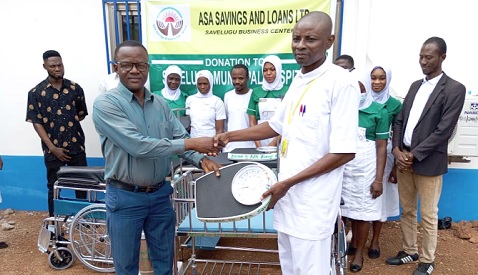
The Savelugu Municipal Hospital in the Northern Region has taken delivery of medical equipment worth GH¢17,404 to help enhance healthcare delivery in the municipality.
The items, which include a standard delivery bed, weighing scale, suction machine, autoclave, two wheelchairs and a baby’s cot, are expected to strengthen the hospital’s capacity to provide quality healthcare services.
The gesture by ASA Savings and Loans Limited forms part of its corporate social responsibility (CSR) initiatives aimed at improving healthcare delivery in its operational areas, while complementing the government’s efforts to ensure access to quality healthcare.
Improving healthcare
At a brief ceremony to hand over the items, the Tamale North Area Manager of ASA, Martin Yenuman Weingam, said equipping the hospital would ease the burden on patients in Savelugu and surrounding communities.
“Businesses can only thrive when people are healthy. If clients are not in good shape, they cannot expand their businesses or take care of their families.
That is why we have brought this equipment to support healthcare delivery here,” he stated.
Mr Weingam added that the donation would help the hospital cut down on costs associated with procuring new equipment, thereby allowing management to allocate resources more efficiently.
While pledging the company’s continued support in its operational areas, he urged the public to prioritise their well-being by visiting health facilities regularly for check-ups.
The Branch Manager of ASA Savings and Loans at the Savelugu Business Centre, Iddrisu Abdul-Rahaman, added: “Our clients live here in Savelugu and its environs, and this is where they seek healthcare. It is only right that we support the hospital with the little we have.”
Commendation
Receiving the items, the Head of Administration at the Savelugu Municipal Hospital, Joseph Yakubu, commended the company for the gesture and said it would go a long way to enhance healthcare delivery in the hospital.
He indicated that the facility delivers about 400 babies every month but has only two delivery beds, creating inconvenience to many women in labour.
“We deliver some babies on the floor because our delivery beds are not enough.
After delivery on the existing bed, we sometimes place mothers on the floor to admit other patients.
This support has come at the right time,” he said.
Mr Yakubu assured that the equipment would be properly maintained and used for its intended purposes to improve healthcare delivery in the municipality.



